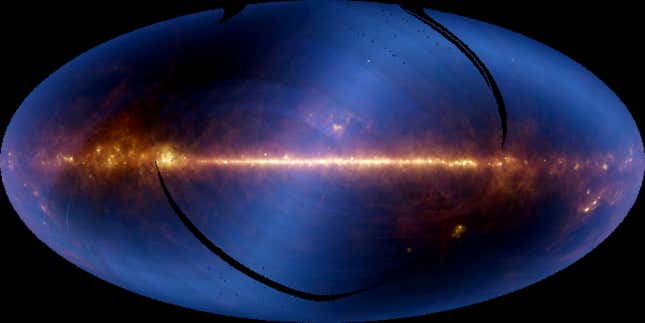
In 1983, astronomer Michael Rowan-Robinson conducted a search for a proposed 10th planet (Pluto still being a planet at the time) using data from the Infrared Astronomical Satellite, the first infrared space telescope. Rowan-Robinson didn’t turn up a new planet, and by 1991, he was pretty sure that such a planet did not exist, at least not in the area of the sky he looked in.
But since then, new regions of the sky have been proposed as potential homes of a hidden planet, now called Planet Nine. Some astrophysicists suspect that a planet—or at least, something with a lot of gravity—exists out there due to the movements of objects in the Kuiper Belt, a distant disc of comets, asteroids, and icy things beyond the orbit of Neptune.
On the heels of recent research that suggested new potential hiding spots for Planet Nine, Rowan-Robinson revisited the 38-year-old data and found three infrared sources that he says could be the theorized world. His paper is set to be published in the Monthly Notices of the Royal Astronomical Society and is currently hosted on the preprint server arXiv.
Planet Nine (formerly Planet X, said like the letter) has long been considered a possibility. The discovery of Neptune in 1846 came after astronomers found Uranus’s orbit was slightly different than math predicted. They realized that something was perturbing Uranus gravitationally; that object turned out to be an eighth planet.
Observations of Neptune then led astronomers to believe there may be yet another planet out there, messing with the newly discovered world’s orbit. Pluto was found in 1930 by looking at objects on photographic plates, but it couldn’t account for the movement of Neptune.
Scientists who search for Planet Nine estimate that its mass is several times bigger than Earth’s, with an orbit lasting thousands of years. Of course, Planet Nine is just one answer to the quandary of why some objects’ orbits are wonky. One alternative theory is that instead of Planet Nine is actually a ring of debris. Others have suggested the “planet” could be a bowling ball-sized black hole.

For the recent work, Rowan-Robinson redid his search from nearly 40 years ago and found three points in the data from late summer 1983 that indicate some object moving across the sky. The data sources sit low on the galactic plane, though, meaning that the satellite was taking the data through plenty of dusty, cloudy material that can emit infrared light.
In other words, the work is something of a long shot. And Rowan-Robinson is well aware of that. “Given the poor quality of the IRAS detections, at the very limit of the survey, and in a very difficult part of the sky for far infrared detections, the probability of the candidate being real is not overwhelming,” he wrote in his paper.
But that’s no reason not to dig further. It’s not cryptoastronomy; people looking for a ninth planet are investigating a real mathematical problem. It is a particularly “shiny solution,” though, as planetary astronomer Michele Bannister told Gizmodo in 2017.
We may have new answers fairly soon. The Vera Rubin Observatory in Chile is under construction and will image the entire sky every week using the largest digital camera ever built. Compared to when astronomers had to use just their eyes to search for changes in the cosmos, we now have artificial intelligence that can detect intriguing signals in data far beyond the abilities of the naked eye. It’s fair to say we’re closer to finding out the truth than we were before. Good things come to those who wait... but hopefully we won’t have to wait much longer.
More: Is the Elusive ‘Planet Nine’ Actually a Massive Ring of Debris in the Outer Solar System?